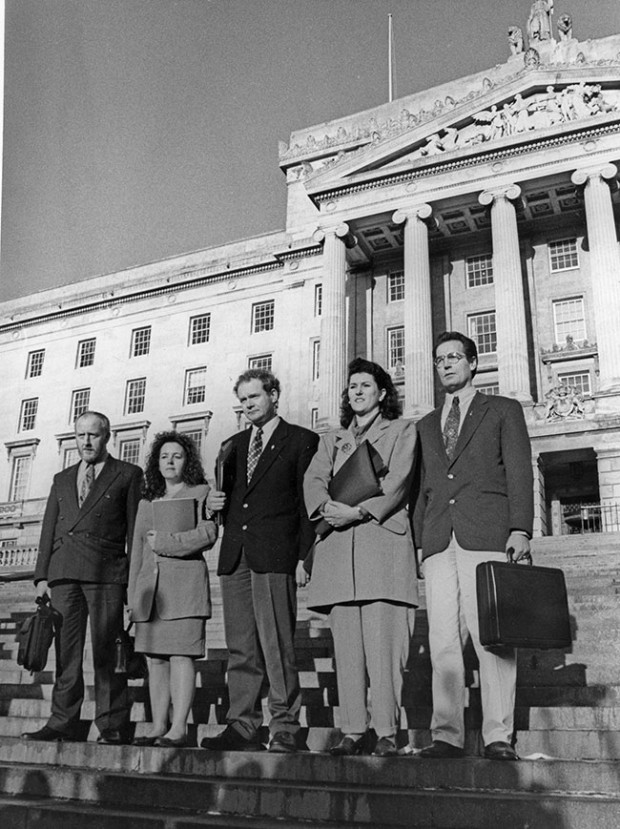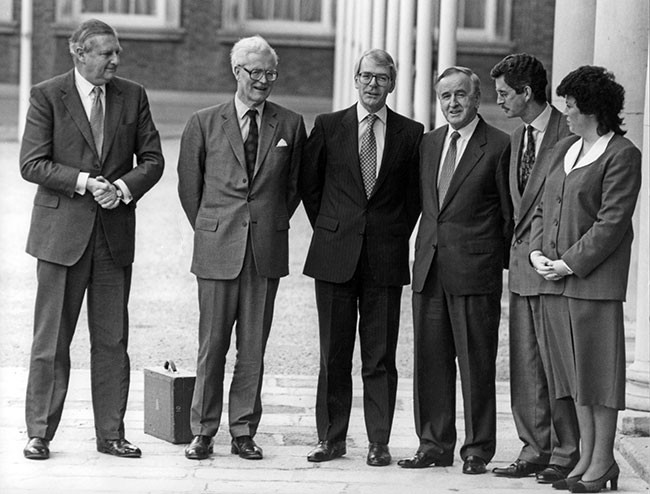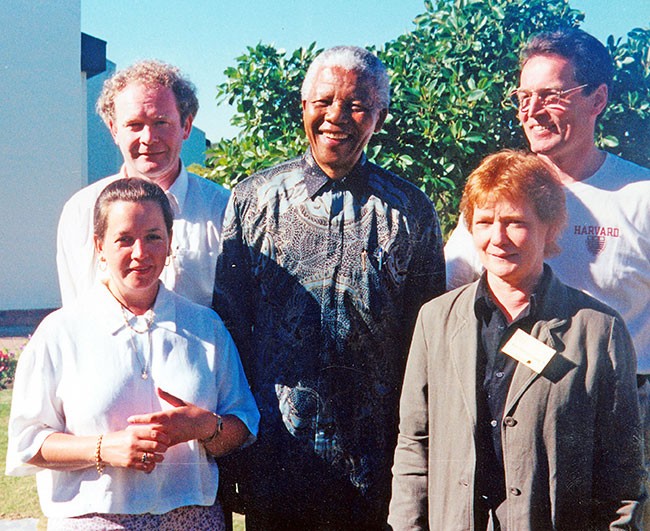23 February 2023 Edition
‘It always seems impossible until it’s done’

• Sinn Féin team, Stormont 9 December 1994: Sean MacManus, Siobhán O'Hanlon, Martin McGuinness, Lucilita Bhreatnach and Gerry Kelly
Gerry Kelly has been one of the central Sinn Féin negotiators over the last 30 years, from the secret talks with British Government representatives in 1993 to the present day. Here he highlights some key events in that journey.
• • • • • • • • •
There is a library of books and articles already in existence analysing every aspect of the Good Friday Agreement and the period before and after. Perhaps it has all been said, but I have been asked to write a few thoughts on my part in this negotiation process.
I think the first thing to be said for the record is that Sinn Féin’s peace strategy evolved over a ten-year period. The first document produced was ‘Scenario for Peace’ (1987), followed by ‘Towards a Lasting Peace’ (1992). The essence of these documents, which Gerry Adams authored, was the need for a peace process which could deal with the actual causes of the conflict. That needed ongoing political engagement with our opponents and Sinn Féin trying to build a consensus in Ireland for a negotiated settlement of the conflict.
A line of communication between Sinn Féin and the British government had existed over many years in the 1970s and 80s. It was sporadic in nature but was re-activated by the British government in the early 1990s.
All of this was happening as I was released from prison in 1989. I had joined Sinn Féin on release and was part of the discussions that were going on at that time. I was honoured to be asked to accompany Martin McGuinness to an exploratory meeting with a British government representative on 23 March 1993.
I took a note of the meeting in which the British representative stated, amongst other things, “The final solution is union. It is going to happen anyway…..Unionists will have to change. This island will be as one.”

• British Secretary of State Patrick Mayhew, Home Secretary Douglas Hurd, Prime Minister John Major with Irish Taoiseach Albert Reynolds, Tánaiste Dick Spring and Máire Geoghegan-Quinn during an Anglo-Irish Summit in Dublin, December 1993
I was surprised by this and by the fact that he said that only Prime Minister John Major, British Secretary of State Patrick Mayhew, Home Secretary Douglas Hurd, and the secretary to the Cabinet knew about this meeting and the possibility of Sinn Féin delegation meetings. When we went back to Gerry Adams and the rest of the Sinn Féin team and discussed the meeting, I’m not quite sure what each individual thought. I knew it was a meeting of significance, but wasn’t thinking of it as a seminal moment, though in hindsight perhaps it was.
The general Sinn Féin team’s view, as I remember it, was to engage but do so cautiously as the British representative could say these things in private but where was the guarantee that it was the actual view of the British Prime Minister and Cabinet. If there was to be a negotiation, then there had to be a public manifestation of this and that it had to involve more than just Sinn Féin and the Brits. It had to be representative of all the interested parties in Ireland.
It was agreed to push forward to talks. An IRA cessation of military activity was announced on 31 August 1994. The IRA had agreed to this to create a peaceful space and atmosphere for talks to take place.
A few months later, I was attending my niece’s wedding in the Devenish Arms Hotel in Belfast. I left it to stand on a platform outside the Sinn Féin office on the Falls Road to be introduced publicly, with others, alongside Martin McGuinness, as a member of Sinn Féin’s negotiating team. I was very honoured, but re-joined the wedding a short time later, and consumed a modicum of alcohol, thinking I had better make the best of it as we were going to be very busy. I wasn’t expecting it to be for decades!
It was on 9 December 1994 that Martin McGuinness, our Chief Negotiator, led myself, Lucilita Breathnach, Siobhán O’Hanlon, and Seán MacManus up the steps of Stormont to face the British team led by the NIO’s permanent under-secretary, Quentin Thomas.
I remember that there was quite a substantial team of British civil servants across the table. The head of the civil service, John Chillcot, had decided not to come! These meetings under John Major’s Premiership, quickly appeared to be stalling mechanisms, to slow things down, presumably because he led a minority government and depended on Unionist votes to remain in power.
However, when Labour came to power with a huge majority under Tony Blair in May 1997, things changed. The negotiations which led to the GFA really began in September 1997. Many things had happened in the meantime, including Sinn Féin being excluded from talks.
Something that has stuck in my head from then is that the same civil servants who sat across the table in 1994, filibustering, now began to engage on the real issues and things started to show real signs of engagement.
One of the other extraordinary facts is that the Unionists led by David Trimble stubbornly refused to talk directly to Sinn Féin. In a way, the epitome of this manifested itself when the South African Government under Nelson Mandela invited all the parties to Arniston, South Africa to allow for relationship building away from the public eye.

• Sinn Féin team, Stormont 9 December 1994: Sean MacManus, Siobhán O'Hanlon, Martin McGuinness, Lucilita Bhreatnach and Gerry Kelly
When we arrived by commercial flight in Johannesburg, the South African Air Force were flying us on to our destination. The Unionist delegation refused to travel on the same transport, so they all piled on to a military Hercules jet while we were given a small and very comfortable Executive jet for the same journey.
This continued when a picnic was organised for the beach some distance away from the conference centre. While the others travelled in a large coach, we travelled in a minibus with a couple of South African Ministers. The Women’s Coalition members came with us. We arrived first and sat about picnicking. The coach carrying everyone else passed by on the upper road a number of times because David Trimble refused to come down while we were there!
To cap it all, when it was announced that Nelson Mandela was coming to address us all, the Unionist delegation demanded a separate meeting with the President. This appalled the South African hosts, which included a number of government ministers. Mandela, in his own inimitable way, acceded to the request but said to the Unionist delegations that they would not achieve anything by simply talking to their friends.
Despite, all of the difficulties, the Good Friday Agreement was signed, despite Jeffrey Donaldson, Arlene Foster, and others walking out. It was indeed an historical event which was massively endorsed across Ireland. For Irish republicans, it was not the resolution of all the causes of conflict, but it did achieve a political way forward to the goal of a united Ireland, a democratically agreed Ireland.
At the time, I certainly didn’t imagine that 25 years after the signing of the GFA that we would still be negotiating in an attempt to properly implement the GFA and subsequent agreements.
Nelson Mandela once stated that “It always seems impossible until it’s done”. Many things that seemed impossible beforehand were achieved in the Good Friday Agreement and other subsequent negotiations. We are closer to a United Ireland now than we have ever been in history. We still cannot do it on our own. We are in a phase of democratic persuasion, a negotiation on what is the best future for all who live in Ireland.
As I finish this short snapshot of that period, Jeffrey Donaldson, who walked out of the GFA negotiations in 1998, is now the leader of the DUP. He and his party have big decisions to make as the present negotiations between the EU and the British Government come to a close.
• Gerry Kelly is a Sinn Féin MLA for North Belfast and the party’s Assembly spokesperson for policing




